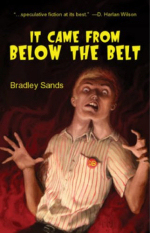Remember to BLINK by Jason M. Heim (first published at DepravedPress.com)

Note: This review originally appeared in the now defunct DepravedPress.com
Jason M. Heim. Remember to Blink. Lulu.com, 2003-04. $15.99, paper, ISBN: 1-4116-1121-7.
The narrator of Jason M. Heim’s debut novel, Remember to Blink, suffers from what might best be described as a chronic case of boredom. Taking a cue from his mundane job in computer software maintenance at one of the world’s largest computer manufacturers, the unnamed narrator creates for himself an autopilot personality which he uses to handle tedious tasks while a separate, conscious part of his brain can ponder deeper ideas: “[…] whatever high concept my mind thinks is the flavor of the month. Things like evolution” (19). And evolution is one of the many trains this mind rides throughout the novel’s stream-of-consciousness styled rant, presented successfully, as a well crafted novel about a struggle for control and the resulting infinite burden this struggle carries.
What might initially seem like a cheap gimmick, the narrator claims early on in a faux forward that he is not an author, and later (but still very early in the novel) that he has done no research, outlining, or preparation, ultimately proves to be a necessary admission. The narrator claims at the top of page 2:
Given my mind’s tendency to wander, I can’t promise chronological continuity. And it may seem like it doesn’t make sense. For you, the beloved reader, these disjointed accounts of my life may seem to be rather random. But if you’re going to understand, you need to experience it. For me, this lack of continuity is a way of life.
This clever device—a therapeutic memoir—allows any inconsistencies and character flaws to be glossed over and forgotten. Fortunately, however, flaws and inconsistencies are few and the story holds together well, presenting itself in such a way that only this straightforward narrative style could justify.
Obvious comparisons to the contemporary trend of first-person, nihilistic, stream-of-conscious novels will be made. Unfortunately, the popularity of Fight Club by Chuck Palahniuk and its more popular movie adaptation have made it hard to claim the schizophrenic narrator as an original device (RTB’s minimalist style and use of jargon-laden rants doesn’t help to broaden the distinction). But RTB handles the burden well. By subtly—and more importantly, consciously—creating the autopilot personality Heim’s narrator is able to introduce and develop the ulterior personality as an part of himself, rather than attempting to fool the reader into thinking it is a completely separate person.
Furthering the success of this distinction Heim transitions seamlessly early in the novel from the autopilot as a concept to the autopilot as a believable and effective character trait. Step back and hear of this novel from a friend and you would understandably doubt this sort of effective execution, but read the damn thing and you’ll see that it works.
RTB is a theme-driven novel, using the characters’ mind-space to explore these themes. Think the way most contemporary literature commentaries tend to do. Any of Palahniuk’s earlier works are arguably platforms to express the author’s social discontent. Bret Easton Ellis’s American Psycho is similar in this regard; sacrificing deep character development for social observation. Heim goes this route, exploring the motif of control as a way to steer evolution. But the novel tends to suffer from its own exploration of tedium as the ultimate destructor. Page after page of cleverly twisted phrases designed to appear deep can wear at a reader’s mind. The rants can be very insightful—especially toward the end of the novel when the narrator’s newly discovered philosophy of Christianity is skillfully incorporated into his already robust set of beliefs—but before the reader really has time to absorb the moments of insight he is shoved into another rant filled with more clever phrases—sometimes logically related; sometimes not. But this is all, as the narrator states early on, a way to “[…] figure out how I got here” (2). And the patient reader willing to accept this will be greatly rewarded by the satisfying climax and unconventional denouement (hint: when you think you’ve found a plot hole in chronology, you haven’t).
Despite a few jarring choices in narrative style, Remember to Blink succeeds as a probing literary novel with a lot to say and the right mouth to say it. One would hope that Jason M. Heim has more to say and won’t make us wait long to hear it.


